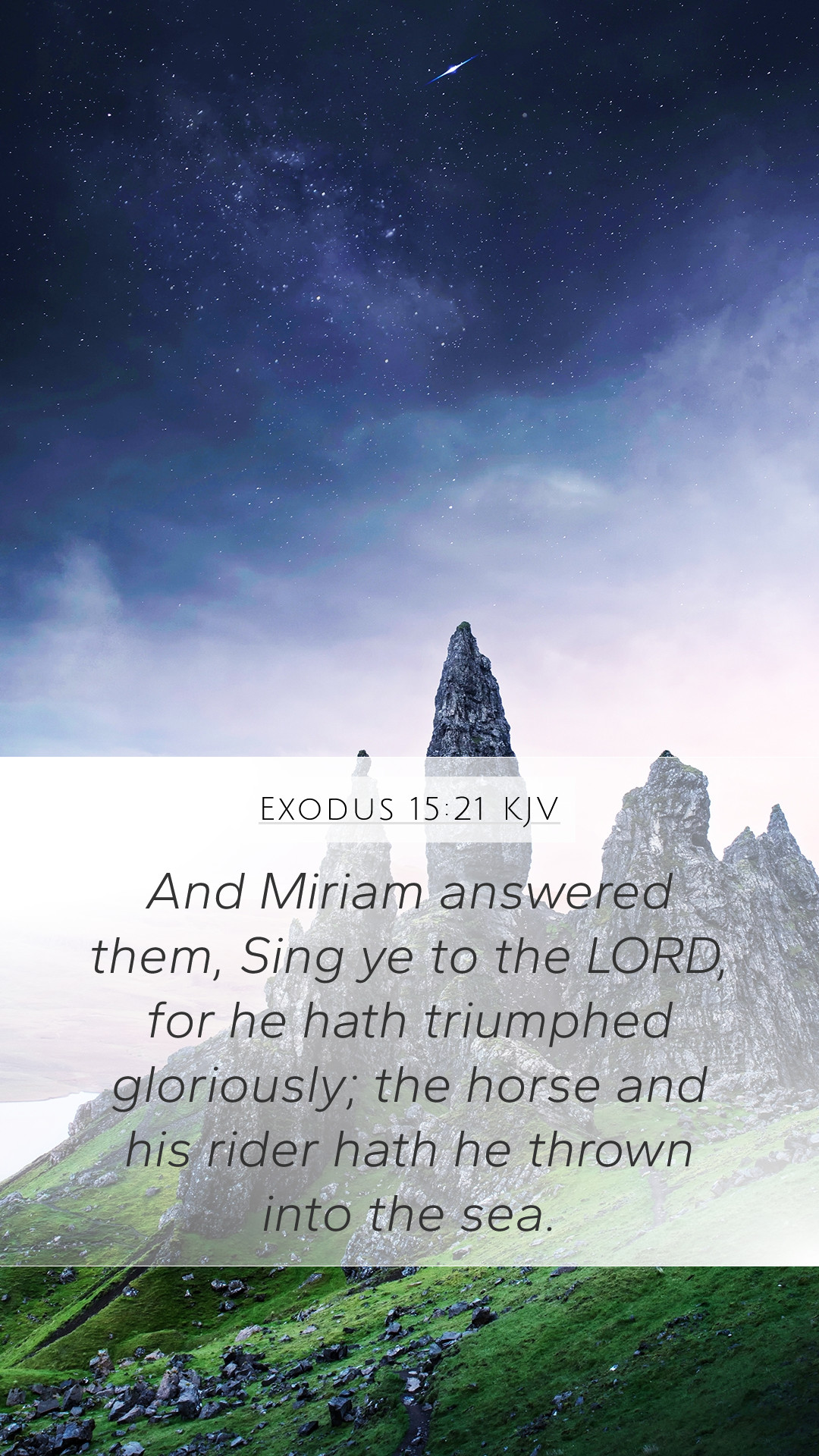Understanding Exodus 15:21
Exodus 15:21 states, "And Miriam answered them, Sing ye to the Lord, for he hath triumphed gloriously: the horse and his rider hath he thrown into the sea." This verse occurs after the Israelites' miraculous deliverance from the Egyptian army at the Red Sea. Miriam, the sister of Aaron and Moses, leads the women in song, celebrating God's victory. Below, we provide a detailed exploration of this verse's meaning through the combined insights of respected public domain commentators.
Bible Verse Meanings and Interpretations
Exodus 15:21 serves as a powerful expression of thanksgiving and praise to God for His mighty acts of salvation. It represents a pivotal moment in Israel's history, marking a transition from bondage in Egypt to freedom and divine deliverance.
-
Matthew Henry: Henry emphasizes the joy and triumph expressed in this verse. He notes that Miriam’s song not only acknowledges God’s power but also reflects the joy of the people in recognizing what God has done for them. The song serves as a declaration of faith, encouraging the community to revel in their deliverance.
-
Albert Barnes: Barnes highlights the fervent spirit of worship found in this verse. He suggests that Miriam's command to "Sing ye to the Lord" invites all to join in a communal act of worship, reinforcing the idea that corporate praise is vital in responding to God’s deliverance. This verse emphasizes the importance of expressing gratitude for God's interventions in our lives.
-
Adam Clarke: Clarke addresses the cultural significance of song in the ancient Hebrew context. He points out that singing after a great victory was a customary way of expressing emotion and commitment to God. Miranda's proclamation of God’s triumph is also seen as a foreshadowing of Christ's ultimate victory over sin and death.
Scripture Analysis and Biblical Exegesis
From an analytical standpoint, Exodus 15:21 is a microcosm of the wider themes of liberation and divine sovereignty present in the Exodus narrative. It portrays the communal nature of worship where individual voices are united in praise. This verse aligns with the theological theme of God as a warrior who fights for His people.
Meaning of Biblical Exegesis
Exodus 15:21 invites us to consider the broader implications of God’s victory over oppressors not only in historical terms but also in the lives of believers today. Biblical exegesis reveals that singing and praising God are foundational responses to His delivering power.
Bible Study Insights
When studying this verse, it's helpful to consider the context of the Israelites' journey. Having just experienced the parting of the sea and the destruction of Pharaoh’s army, Miriam’s song encapsulates the first recorded celebration after a significant salvation event. It serves as a model for how we might respond to our own experiences of deliverance through song and worship.
Understanding Scripture: Application to Daily Life
The application of Exodus 15:21 can be profound. Just as Miriam encouraged the Israelites, we too are called to offer praise to God for His work in our lives. This verse challenges us to reflect on our personal experiences of God's deliverance—from spiritual bondage or life's challenges—and to express that gratitude joyfully.
Significance of Exodus 15:21
This verse holds significance not just as part of the Exodus narrative but as a timeless reminder of the importance of praise in the life of a believer. It invites us to reflect on our collective experiences of God’s faithfulness and to join together in worship, creating a community strengthened through shared narratives of faith.
Cross References
- Psalm 118:14: "The Lord is my strength and song, and is become my salvation."
- Isaiah 12:2: "Behold, God is my salvation; I will trust, and not be afraid."
- 1 Corinthians 15:57: "But thanks be to God, which giveth us the victory through our Lord Jesus Christ."
Conclusion
In summary, Exodus 15:21 serves as a continual reminder that our response to God’s works is one of praise and thanksgiving. By examining this verse through the lenses of various commentaries, we gain a fuller understanding of its importance in both historical and contemporary contexts. This encapsulates the essence of Bible verse commentary, providing clarity on how we might interpret and apply such scriptures in our lives.


